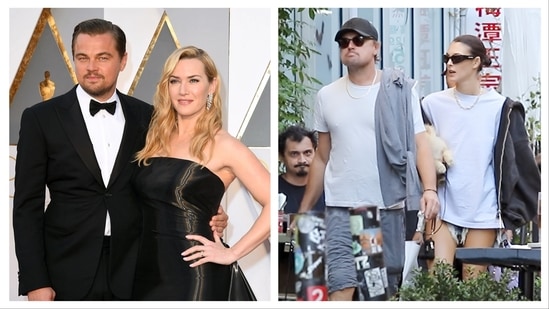
The headline itself, "Kate Winslet Wants Leonardo DiCaprio to Settle Down With Vittoria Ceretti," is a tabloid concoction, a speculative whisper amplified into a declarative statement. It's a piece of gossip, designed to pique our curiosity and draw us into the never-ending saga of Leonardo DiCaprio's love life. But beneath the surface, it reveals a deeper cultural fascination with celebrity relationships, the pressures we place on public figures, and the enduring power of on-screen chemistry.
The very idea that Kate Winslet, DiCaprio's longtime friend and collaborator, is actively trying to orchestrate his romantic life speaks to our perceived ownership of celebrities. We feel entitled to comment on their choices, to offer unsolicited advice, and to even fantasize about their personal lives. This feeling stems from a parasocial relationship, a one-sided connection we develop with celebrities through their performances, interviews, and public appearances. We feel like we know them, understand them, and are invested in their well-being, even though they have no idea who we are.
The specific pairing of DiCaprio with Vittoria Ceretti, a successful model, is almost predictable. DiCaprio's well-documented preference for dating young models has become a running joke, fueling countless memes and op-eds. The public scrutiny surrounding his choices highlights the double standard often applied to men and women in Hollywood. While DiCaprio's dating habits are met with amusement or mild disapproval, a woman of a similar age and reputation would likely face far harsher judgment.
Furthermore, the imagined intervention of Kate Winslet taps into the enduring power of their on-screen romance in "Titanic." For many, Jack and Rose represent the epitome of love, a passionate and enduring connection that transcends social barriers. The real-life friendship between Winslet and DiCaprio only strengthens this association. We want them to approve of each other's partners, to endorse the idea that their love story, though fictional, still holds a special place in their hearts. It's a nostalgic yearning for a simpler, more romantic ideal, projected onto the real lives of two actors.
The absurdity of the headline also points to the relentless pursuit of news, however tenuous, about celebrities. Tabloids thrive on speculation, rumors, and half-truths, knowing that audiences are hungry for any tidbit of information about their favorite stars. The pressure to constantly deliver new content fuels the creation of these narratives, often at the expense of accuracy and personal privacy. In this instance, the headline is likely based on nothing more than a passing comment or a speculative article, yet it's presented as a verifiable fact.
In conclusion, the headline "Kate Winslet Wants Leonardo DiCaprio to Settle Down With Vittoria Ceretti" is more than just a piece of celebrity gossip. It's a reflection of our parasocial relationships with celebrities, the double standards of Hollywood, the enduring power of on-screen romance, and the insatiable demand for celebrity news. It highlights the often-unrealistic expectations we place on public figures and the blurry line between entertainment and reality in the age of instant information. Ultimately, it reminds us that behind the headlines are real people, whose lives are often subject to relentless scrutiny and speculation. Whether Kate Winslet actually wants DiCaprio to settle down with Ceretti is irrelevant; the headline itself has already sparked a conversation about the complicated relationship between celebrities and their audience.
